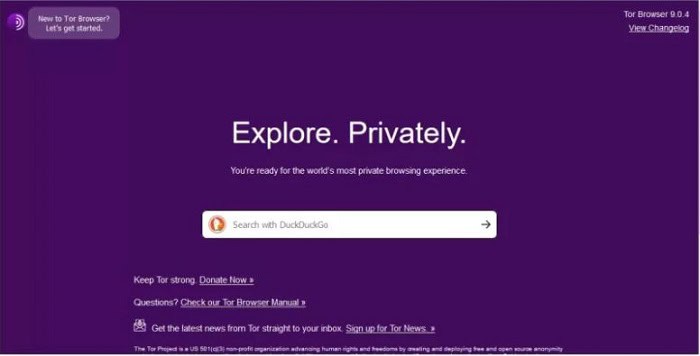

The Tor Browser does have its flaws, which we’ll go into a bit later. And yes, unfortunately, those seeking to perform criminal acts also use it. Other users appreciate the browser as it allows them to circumvent censorship. The Tor Browser is a popular online anonymity tool among political activists and journalists who fear totalitarian governments monitoring or arresting them.

You can access these websites without worrying about someone snooping on a Tor exit node, offering more private browsing of what is known as the deep web. The Tor browser provides access to “.onion” websites, which are Tor hidden services that you can only access through the Tor browser. When the browser is closed, it deletes all privacy-sensitive website data such as browsing history and cookies. The browser isolates each website you visit, so it prevents trackers and ads from following you online. The Tor Browser automatically routes its traffic through the anonymous Tor network. The Tor Browser (“The Onion Router”) is a product of the Tor Project, which was founded on the belief that “internet users should have private access to an uncensored web.”

I’ll go into how the Tor system works, explain the Onion Network, what a relay is, and how to make the Tor Browser work best to protect your online privacy and anonymity. In this comprehensive guide, I will endeavor to answer those questions and many more.
 Should I use a VPN (Virtual Private Network) with the Tor Browser?. Is the Tor Browser really that good at protecting users online?. You probably have questions about the Tor Browser, such as, Select OK on the prompt to grant the VPN permission to monitor your network traffic.If you are reading this, you’ve likely heard about how the Tor Browser can help protect your internet privacy and anonymity online. When you open a VPN app for the first time, your Chromebook should display a connection request prompt. Open the Playstore, find your preferred VPN, and install the app. For step-by-step instructions, refer to our tutorial on installing and running Linux apps on Chromebooks.Īndroid apps work on Chrome OS, so you can install and use Android VPN apps on your Chromebooks without issues. If the app isn’t on the Playstore, install the VPN’s APK file or Linux setup file on your Chromebook. If your Chromebook doesn’t support the Android app, use the Chrome VPN apps or extensions. The Chromebook VPN apps listed above are available on the Google Play store. If you don’t like the app, request a refund within 45 days of purchase. When you buy a subscription, you enjoy a 7-day free trial and 45 days to use the VPN risk-free. Depending on your subscription plan, you can simultaneously use the VPN on 5-25 devices. A subscription hands you access to extensive server networks (115+ locations and 500 servers), streaming mode, gaming mode, etc.
Should I use a VPN (Virtual Private Network) with the Tor Browser?. Is the Tor Browser really that good at protecting users online?. You probably have questions about the Tor Browser, such as, Select OK on the prompt to grant the VPN permission to monitor your network traffic.If you are reading this, you’ve likely heard about how the Tor Browser can help protect your internet privacy and anonymity online. When you open a VPN app for the first time, your Chromebook should display a connection request prompt. Open the Playstore, find your preferred VPN, and install the app. For step-by-step instructions, refer to our tutorial on installing and running Linux apps on Chromebooks.Īndroid apps work on Chrome OS, so you can install and use Android VPN apps on your Chromebooks without issues. If the app isn’t on the Playstore, install the VPN’s APK file or Linux setup file on your Chromebook. If your Chromebook doesn’t support the Android app, use the Chrome VPN apps or extensions. The Chromebook VPN apps listed above are available on the Google Play store. If you don’t like the app, request a refund within 45 days of purchase. When you buy a subscription, you enjoy a 7-day free trial and 45 days to use the VPN risk-free. Depending on your subscription plan, you can simultaneously use the VPN on 5-25 devices. A subscription hands you access to extensive server networks (115+ locations and 500 servers), streaming mode, gaming mode, etc.








 0 kommentar(er)
0 kommentar(er)
